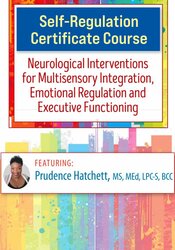
×

Regulation is the key to paying attention, active participation, and learning. But getting kids with autism, sensory processing disorder, and ADHD regulated requires specialized knowledge and skills!
To effectively address challenging behaviors like hyperactivity, aggressiveness, self-stimulation, and inattentiveness in children and adolescents, it’s essential to know the underlying brain processes and how to intervene accordingly.
Join self-regulation expert, special educator, and counselor, Prudence Hatchett, MS, Med, NCC, LPC-S, BC-TMH, for this advanced training and learn the connection between neuroscience and self-regulation to help you select and develop effective self-regulation interventions.
Under Prudence’s expert guidance, you will learn proven neurologically tailored sensory strategies, environmental modification, and emotional regulation strategies, as well as mindfulness, social skills programs, and music and movement to improve regulation.
By learning how to skillfully integrate these strategies you will be able to:
Whether you are an expert on the brain or new to this science, Prudence makes it easy to understand and easy to implement!
Register today!
NOTE: Each purchase includes CE credit for one individual (participants in full attendance will be able to print the certificate of completion after passing the online post-test (80% passing score) and completing the evaluation). Instructional methods will include PowerPoint, didactic lecture, Q&A, and others.
Continuing Education Information: Credits listed below are for full attendance at the live, interactive webinar only. This webinar is being broadcast live in real-time and must be attended live, in its entirety, in order to earn credit. You will be able to type questions to the speaker. The speaker will see the questions and address them during the presentation as time allows. Please note, your licensing board dictates whether web-based activities are an acceptable form of continuing education, as well as which credit types are acceptable for continuing education hours. Please refer to your licensing board's rules and regulations. If your profession is not listed, please contact your licensing board to determine your continuing education requirements and check for reciprocal approval. For other credit inquiries not specified below, please contact info@pesi.com or 800-844-8260 before the event.
Materials that are included in this course may include interventions and modalities that are beyond the authorized practice of your profession. As a licensed professional, you are responsible for reviewing the scope of practice, including activities that are defined in law as beyond the boundaries of practice in accordance with and in compliance with your profession's standards.
For Planning Committee disclosures, please see the statement above. For speaker disclosures, please see the faculty biography.
Earn up to 12.5 CE hours. Please see below, for more details, as credit amounts vary by jurisdiction and profession.
PESI, Inc. is approved by the Canadian Counselling and Psychotherapy Association to offer continuing education for counsellors and psychotherapists. PESI, Inc. maintains responsibility for the program. This activity is approved for 12.5 credit hours.

PESI, Inc., #1062, is approved as an ACE provider to offer social work continuing education by the Association of Social Work Boards (ASWB) Approved Continuing Education (ACE) program. Regulatory boards are the final authority on courses accepted for continuing education credit. ACE provider approval period: January 27, 2023 - January 27, 2026. Social workers completing this course receive 12.75 Clincial continuing education credits.
Course Level: Intermediate Format: Synchronous distance. Full attendance is required; no partial credits will be offered for partial attendance.
Canadian Social Workers: Canadian provinces may accept activities approved by the ASWB for ongoing professional development.
This activity qualifies for 760 continuing education minutes as required by many national and local licensing boards and professional organizations. Save your activity advertisement and certificate of completion, and contact your own board or organization for specific requirements.

Prudence Hatchett, MS, MEd, LPC-S, BCC, is a dedicated and multifaceted mental health professional with over 14 years of experience in behavioral health, education, and mental wellness. As a National Certified Counselor (NCC), Licensed Professional Counselor (LPC), Board Certified Telemental Health Provider (BC-TMH), and Advanced Certified Autism Specialist (ACAS), she brings a wealth of expertise to her trainings.
Prudence holds an MEd in counselor education and a master-level emotional disability endorsement from the University of Mississippi, alongside an MS in special education and a BA in psychology from Mississippi State University. She is also certified as a Clinical Anxiety Treatment Professional (CCATP) and holds Key Leadership Skills Certification (KLSC), enhancing her approach to client care and leadership.
Prudence is the owner of PH Counseling, LLC, which offers counseling, coaching, and online courses, as well as the author of Behavior is Not a Destination, It’s a Process, a practical guide to behavior management. Additionally, she is a positive lifestyle writer, with published articles, blogs, and poems to further support her mission to empower others.
Speaker Disclosures:
Financial: Prudence Hatchett is the owner of PH Counseling, LLC. She receives royalties as a published author. She receives a speaking honorarium from PESI, Inc. She has no relevant financial relationships with ineligible organizations.
Non-financial: Prudence Hatchett has no relevant non-financial relationships.
For live CE credit, you must watch the live webcast in its entirety at its scheduled time and complete the CE quiz and evaluation within one week. You will have access for 90 days after the program for review.
Please note: There will be a 70-minute lunch and two 15-minute breaks; one in the morning and one in the afternoon. Lunch and break times will be announced by the speaker and at their discretion. A more detailed schedule is available upon request.
Visit our FAQ page at https://www.pesicanada.ca/faq or contact us at https://www.pesicanada.ca/contact-us.
Satisfaction Guarantee
Your satisfaction is our goal and our guarantee. Concerns should be addressed to info@pesicanada.com.
Please wait ...